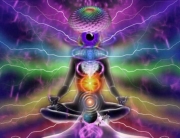We of the realms concur, but as many of the universal truths emerging in the consciousness of humanity, they are perceived before they are understood. To simply declare to those residing in a third-dimensional reality that there is no polarity is not only foolhardy but impractical to implement without some explanation.
Perhaps at this point it may be worth reminding the reader that consciousness is the melting pot of potential, and within it all creation exits. From, let’s say, consciousness’ point of view, “If it is, it exists. If it exists, it is” without judgment, comment or evaluation. Some may at this point ask, “What about evil?” Let us be clear that this discussion is about understanding polarity, and the reality or validity of evil is for another time.
Now we are well aware that humanity lives in a world of polarity and will until enlightenment has firmly embedded itself into the human psyche, but understanding the source of it is beneficial in putting it into perspective.
Polarity is the result of relative thinking. Something, let’s say, you determine as right or wrong, may not be by another individual or culture. You are always going to look at things from your point of view, influenced by your upbringing, religious beliefs and the culture you live in.
The difficulty of polarity thinking is that it is a judgment of self and others.
Its innate flaw is that it creates rigidity and prejudice toward others. Again, this concept is not a discussion of acceptance of aberrant behaviors but an exploration of the fluidity in the belief of good and bad, right or wrong across both cultural and time lines. The elimination of the belief in polarity does not grant permission for all behaviors but acceptance that cultures or individuals can see things differently than you.
The problem with polarized thinking is that it is on a sliding scale and the “greased pig” of consciousness. So is there a value in polarity thinking for humanity or should it be eliminated? Firstly, it cannot be eliminated from human thinking and, secondly, it has a value in providing norms for human behavior, for making choices in your life. Good, bad, right, wrong are the lines upon the page of your life that you stay between as you write your story.
Is it appropriate for society to have a set of standards, of course. But what your country sees as right or wrong across the sea may not be seen that way by others, and do you have the right, or perhaps responsibility, to impose your thinking on another culture is a topic of conversation in many circles.
The intent of this concept is to remind humanity that the belief in good or bad, right or wrong, is not written in stone. Fear causes humanity to cling to these beliefs to save itself from itself and others. Yet, the release–or at least, the acknowledgment that polarity thinking is fluid–is not permission for a free-for-all in human behavior—but the possibility for growth and expansion for both the individual and society.
Is there polarity in human thinking? Yes. Does it exist in universal consciousness? No.
But since humanity desires it, allow it to be the bar humanity uses to better itself rather than the club to make others wrong.







Leave A Comment